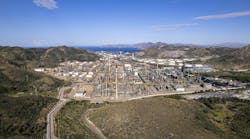CMS Energy Corp., Dearborn, Mich., reported subject to market conditions, it will sell $220 million of convertible trust preferred securities, which are convertible into CMS Energy common stock. Proceeds from the offering would be used to refinance existing trust preferred securities, and will not increase the amount of CMS Energy's outstanding convertible securities, the company said.
Rochester-based Southern Minnesota Municipal Power Agency (SMMPA) said it has selected Northern Alternative Energy Inc. (NAE), Minneapolis, to build a wind electricity facility. Under an exclusive agreement, NAE will begin the project with a 900 kw NEG Micon NM52 wind turbine that will be installed on agricultural land in southwestern Minnesota. Through the program, customers of SMMPA member utilities may choose to purchase wind power in 100 kw-hr blocks for a small premium over their current cost of electricity., the agency explained. Power production is expected to begin Feb. 1, 2001.
Tosco Refining LP reported it has entered into a contract with East Coast Power (ECP), a joint venture between affiliates of Enron North America and El Paso Energy Corp. in which ECP will build a $140 million, 170 Mw combined cycle gas-fired plant to supply electricity and additional steam to Tosco's Bayway Refinery in Linden, NJ. When the plants comes on line in the fourth quarter of 2001, Tosco will consume 125 Mw and is projecting $12 million/year in savings. The balance of 45 Mw will sold on the open market. Tosco said it will share in the profits, significantly adding to its projected savings on power costs.
Safeway Inc. (SWY) said all of its 520 California Safeway, Pak `n Save, Vons, and Pavilions stores are participating in an energy conservation program spelled out by California Gov. Gray Davis and the California Grocers Association. The goal is to reduce electric power consumption in stores by taking specific actions that include reducing store lighting by as much as 50%, reducing store air conditioning use, and reducing or restricting use of certain store equipment.
Pacific Gas & Electric Co. said it jointly filed an agreement with the California Public Utilities Commission (CPUC) superseding current plans for auctioning hydroelectric plants to third parties which were filed late last year. The agreement calls for PG&E Corp. to retain the hydroelectric generation system within a California-based affiliate. The other signatories to the agreement include The Utility Reform Network (TURN), the Coalition of California Utility Employees (CUE), Agricultural Energy Consumers Association (AECA), California Retailers Association, Sonoma County Water Agency, and Tuolumne Utility District. Under the proposal, power produced by these hydroelectric facilities would be committed to the market during peak demand. Among other conditions, the agreement returns 90% of any profits from hydroelectric operations to customers, establishes a market value of $2.8 billion for the hydroelectric system that can be used immediately to pay down ratepayer cost obligations, and commits PG&E Corp. to establish a $70 million fund to enhance environmental quality, water quality, and recreational opportunities.
Trinity Industries Inc., Dallas, said it is entering the wind tower structure business for renewable energy with the creation of a new subsidiary, Trinity Structural Towers, Inc. Wind turbines are a significant component in renewable energy and worldwide capital expenditures for this market in 2001 are expected to be strong, said Trinity Chairman Timothy Wallace, adding the company recently booked its first major order from a wind turbine maker.
The New York State Department of Public Service has approved Capstone Turbine Corp.'s MicroTurbine as the first three-phase distributed generation (DG) device permitted to operate in parallel with utilities in New York as part of the state's new DG standard, the company reported. It said the ruling eliminates the need for Capstone to conduct costly, repetitive, and time-consuming verification tests from each of the states' utility companies.

